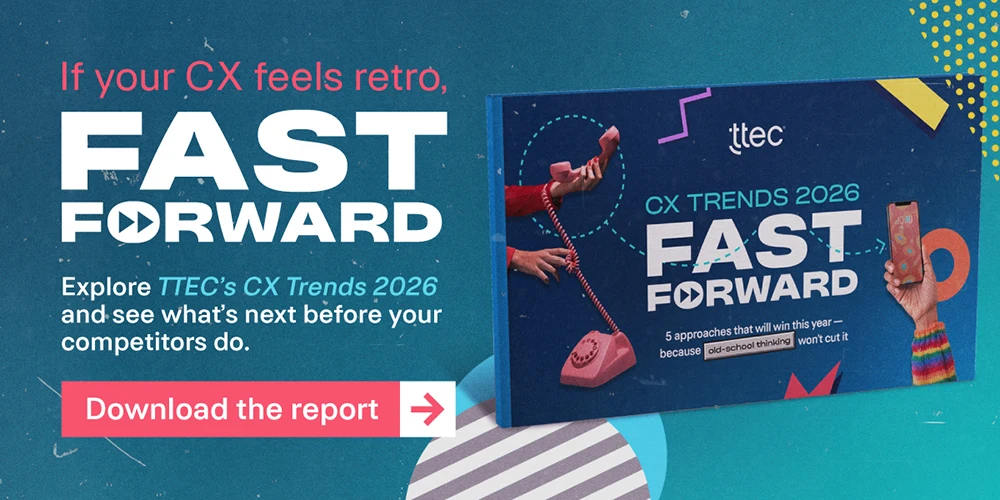Healthcare contact center agents are at the frontline of the member and patient experience by providing crucial support and information. Lack of systems integration, outdated software, inflexible work requirements, and inefficient processes within the industry, however, undermine an associate’s ability to succeed.
TTEC recently showed a national health insurance company how it could save millions of dollars in reduced spend and enhance the member experience by optimizing its workforce and adopting key digital innovations. For this large healthcare organization, the path to success included two major components: optimizing the workforce and simplifying the contact center with digital innovations. Several insights emerged and here are the key takeaways that have applicability across the healthcare industry:
Build flexibility with a Smart Seasonal staffing approach
Optimizing the workforce began with rethinking, reenvisioning, and reorganizing the way associates work. Instead of operating in nearly a dozen different locations with high overhead costs and inflexible work requirements, TTEC and the client agreed that shifting associates to work from home in a virtual contact center was a better fit for many reasons. Doing so provides employees with workplace flexibility, increases efficiency and productivity, enables business continuity, and improves employee retention.
Recruiting the right people in a specific geography and ramping up the physical space to house all those associates during peak seasons is also a costly challenge. TTEC’s Smart Seasonal approach addresses this challenge in a number of ways. Smart Seasonal is a unique model structured in partnership with TTEC clients that accounts for the rise and fall in staffing needs by converting a seasonal role into a permanent one and moving associates across countercyclical projects. This drives tenure, performance, and reduces annual ramp expenses, creating a win-win for clients.
We demonstrated to the client how, after the peak enrollment season, contact center agents that provide telesales services for a healthcare organization shifted to providing customer care for a client that offers property and casualty (P&C) insurance services. As a result, the P&C client was able to reduce their staff 60% in Q4 to match the reduced demand, saving $2.3 million. When the P&C client needed to ramp up for Q1, all that was needed was 4 days of reintegration versus 8 weeks of training for new hires. For the Smart Seasonal employees, this provided them with year-round employment, with higher close rates (and higher earned commissions) than a brand-new agent.
Key takeaway: A willingness to embrace flexible and innovative work strategies builds resiliency and nimbleness into an organization’s ability to consistently meet member needs.
Drive retention with a career path
Traditional contact center roles can have high attrition and low engagement rates. This drives costs through higher volumes of recruitment and training and introduces less experienced personnel into the member experience. A significant root cause of high attrition and low engagement is lack of perceived career growth or development.
TTEC’s solution was a career-path architecture that drives more tenured associates toward higher objectives. For example, an associate is hired to handle calls for a department. After successful performance, the associate is uptrained to handle similar calls from another region. After demonstrating mastery of those calls, he or she is uptrained again. As mastery is obtained and superior service is provided, the associate continues to learn new skills. This approach enables associates to build on their experience and develop an expertise that translates into highly knowledgeable member support. Gamifying the process—e.g., earning badges—and appropriately compensating employees for their excellent performance help to incentivize continued growth and development.
Key takeaway: Providing a clear path for associates to enhance their skill set and rewarding them for their work is essential to employee engagement and retention and delivering the experienced support that members are looking for.
Create digital innovations
Advances in artificial intelligence and machine learning also enable employees to accomplish more in less time. For instance, our award winning RealPlay AI platform is an optimized training curriculum that focuses on top call drivers, systems training, and real member scenarios that lets new hires quickly hone the skills they need at their convenience, decreasing training time and increasing knowledge retention. Essentially, learners can experience a live production environment and real customer scenarios in a fully simulated environment. It optimizes learning through a practice-oriented approach within the safety of a virtual experience.
Additionally, automating tasks helps our associates to optimize their skills on tasks that are most important. Robotic Process Automation (RPA) removes humans from the equation to speed up efficiencies and free up contact center associates to focus on more complex member-centric interactions.
For example, asking an associate to manually look up a healthcare provider typically requires over 12 steps from verifying account details to clicking through multiple windows. An RPA-enabled provider lookup can be done in three steps.
Another example of RPA is what we call Advocate Assist and the purpose is to help associates make better, faster decisions. In Advocate Assist, an intelligent virtual assistant listens in on customer interactions and dynamically generates the recommended answer and knowledge article for the associate in a matter of seconds.
Key takeaway: Automation is most effective when it creates member and employee value. This doesn’t mean every part of the member journey should be automated. It means finding the right balance between human interaction and digital efficiency.
A better future worth $14 million
Implementing these recommendations (Centers of Excellence, Smart Seasonal, Career-pathing, RPA, and Advocate Assist) is projected to save our client over $14 million of contact center expenses. If one thinks about the savings, it is coming from reducing customer friction and time waste in healthcare processes.
This translates to greatly enhancing the member and employee experience. It is an ideal winning solution.
The ultimate takeaway is that improving the member experience and reducing costs are not binary choices—with the right partner, organizations can do both, setting themselves up for a better future.















